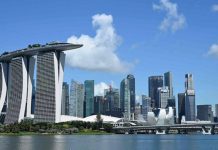Covid-19 infections are surging in several major Southeast Asian economies, and that has led Goldman Sachs to cut its 2021 growth forecasts for most of the region.
The spread of the more transmissible delta variant has pushed daily Covid cases to record highs in Indonesia, Malaysia and Thailand in recent weeks. That has led to more stringent restrictions in Indonesia and Thailand, and an extension of restrictions in Malaysia, Goldman economists wrote in a Thursday note.
In the Philippines, the coronavirus spread has made loosening of social-distancing measures “more unlikely” this year, the economists added

Renewed virus surges and tighter restrictions are likely to “weigh significantly more” on growth in the second half of 2021 than previously thought, the economists said.
Goldman slashed its growth forecasts by more than 100 basis points for Indonesia, Malaysia and Philippines. Singapore and Thailand saw a smaller cut by the bank.
Slow vaccination pace
The rapid climb in Covid infections across Southeast Asia has come as vaccination progress in the region — except for Singapore — has lagged many countries such as the U.S. and the U.K.
Singapore has one of the fastest vaccination rates globally, with over 41% of its population fully inoculated, according to the latest data compiled by online statistics portal Our World in Data.

But the rest of the region is much slower: Malaysia has fully vaccinated 12.4% of its population while Indonesia has inoculated 5.7% of its people fully, the data showed. Less than 5% of the populations in Thailand and the Philippines have been fully inoculated against Covid.
Singapore, which tightened social-distancing measures in early May, started to ease restrictions last month. Goldman economists predicted that Malaysia will be the next to follow suit in the fourth quarter, while the other Southeast Asian economies will only do so in the first half of 2022.
Goldman said stronger global growth will benefit trade-oriented economies such as Singapore and Malaysia the most. Malaysia, which is a net commodity exporter, is also likely to gain from higher commodity prices, the bank said.
Meanwhile, “larger exposures to sectors like tourism, lower exposures to global trade, and limited policy buffers, are likely to push sequential growth lower in Indonesia and Thailand, and keep the sequential growth rebound more muted in the Philippines than our prior expectations,” it added. – (CNBC)
























